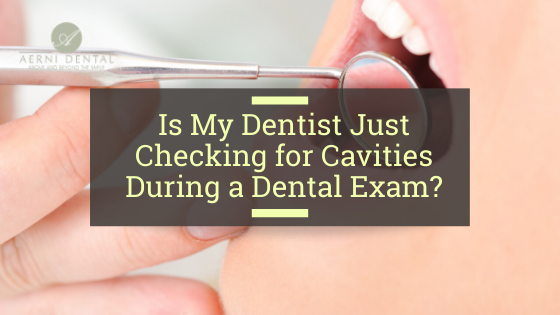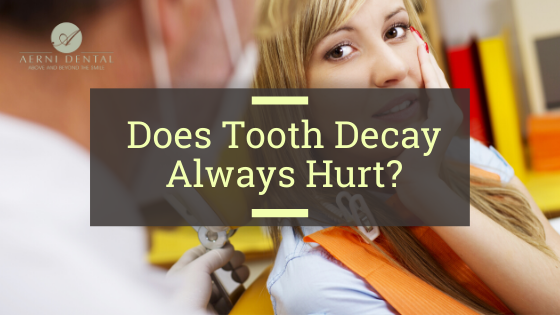WHY IS PREVENTION IMPORTANT?
Preventative Care
Regular dental visits are essential to maintaining healthy teeth and gums. According to the American Dental Association, 80% of adults have some form of periodontal disease. With improper care, infections can start within 1-2 weeks. For maximum benefit, a good home care regimen must be supplemented with a visit to your dentist and/or hygienist at least every six months.
Ultimately, our long term goals are to minimize infections and recognize and treat forces that can lead to premature tooth loss. In addition, we will provide the education necessary to improve your oral health, which in turn leads to better overall health.
Preventative Care
Checking your teeth for decay is only a small part of your exam at Aerni Dental. Along with an oral cancer screening, an evaluation of your bite/occlusion will be performed to check for excessive wear. Dr. Aerni and your hygienist will also check your gums (gingiva) for inflammation, tooth mobility and pockets and then examine your mouth for indications of possible cancer, diabetes and vitamin deficiencies. Your hygienist will clean your teeth and encourage you to maintain good oral hygiene. Dr. Aerni and his staff will listen to any issues you may be experiencing or have concerns about and discuss options for treatment.
Is My Dentist Just Checking For Cavities During A Dental Exam?
 Seeing the dentist for a dental exam is not solely about inspecting for those dreaded cavities. There are good reasons why dentists suggest that we have a dental exam twice a year. Undoubtedly, checkups are important for having a beautiful smile and keeping your teeth and gums healthy. However, exams check for health issues that might not be strictly limited to your gums and teeth.
Seeing the dentist for a dental exam is not solely about inspecting for those dreaded cavities. There are good reasons why dentists suggest that we have a dental exam twice a year. Undoubtedly, checkups are important for having a beautiful smile and keeping your teeth and gums healthy. However, exams check for health issues that might not be strictly limited to your gums and teeth.
Regular dental exams help diagnose problems like tooth decay, gum disease, and many other health problems while they’re still in the early stages. This is particularly helpful as health issues are most easily treatable with early detection. If not detected and treated in the early stages, some diseases can cause severe problems. However, it isn’t only your mouth, as some things your dentist discovers may indicate diseases elsewhere in your body.
Regular visits with the dentist can reduce your risk of various diseases. Putting off professional cleanings will allow the bacteria in your mouth to form a biofilm on your teeth. This bacteria can find its way into blood vessels and tissues, causing inflammation or illness elsewhere in your body.
Your dentist can also help save you from a heart attack. According to the American Heart Association, people who do not get their teeth cleaned regularly have a 24% greater risk of suffering a heart attack and a 13% higher likelihood of a stroke than those who get dental exams regularly. The dentist may also check for high blood pressure in their patients and refer them to a doctor.
Symptoms noticed by your dentist, such as swollen or bleeding gums or tooth enamel erosion, can be signs of diseases such as acid reflux, eating disorders, or osteoporosis. If you have periodontal disease, it may be a sign you could have diabetes. Crohn’s disease could be indicated by ulcers in the mouth, whereas a condition called oral candidiasis might be an indicator of a critical health issue like HIV.
Additionally, dental exams screen for risk factors for diseases like oral cancer.
So, hopefully, you now know why your regular appointments with Dr. Aerni are so important to your health.
Does Tooth Decay Always Hurt?
 Shockingly, of adults, 92% have or had a cavity. Tooth decay is the most common disease on the planet! This is mostly because of the sugar consumption of most people.
Shockingly, of adults, 92% have or had a cavity. Tooth decay is the most common disease on the planet! This is mostly because of the sugar consumption of most people.
Are cavities typically painful? When should you check with Dr. Aerni? Continue reading to learn how to tell if you have a cavity, and how to handle it.
Spotting A Cavity
Cavities happen when the surface of the tooth is damaged by acid and bacteria. This ultimately creates what we call dental caries, or a cavity, which is basically a pit in the tooth enamel. The cavity starts at the outermost layer, the enamel, but will continue on to the dentin, or inner layer of the tooth.
At times, you can spot a cavity if you see a dark spot on your tooth. This won’t always indicate a cavity, though. Occasionally, dark spots may just be stains due to food or drinks.
In other cases, a spot may not be there even when there is a cavity present. Also, these spots could be due to an injury or even be the result of some types of medications. When it comes down to it, you should visit Aerni Dental for an exam, if you suspect you might have a cavity.
What About Tooth Pain?
How far along the cavity is can determine whether or not it causes you pain. There likely won’t be any pain when the tooth decay is only in the enamel, but the pain will start as the decay goes deeper into the tooth. Sensitivity to hot and cold or pain can happen when the tooth decay reaches the dentin of the tooth.
You should always have any tooth pain examined by the dentist since it could lead to a serious infection or the loss of a tooth. The sooner the dentist can address tooth decay, the more likely it will be easier to treat.
Dr. Aerni will check your mouth for cavities by identifying soft spots on your teeth. He will also take x-rays to spot decay that may be hidden, such as between teeth.
How to Protect Yourself From Tooth Decay
You can end up with cavities when foods with sugar or carbohydrates like bread, cake, fruit, candy, and others remain on your teeth for too long. Bacteria in your mouth break these down and turns them into acid. When the acid combines with your saliva, it turns into plaque, which clings to the teeth. It will slowly wear down the enamel of the tooth.
To avoid tooth decay, be sure to steer clear of beverages and foods that are high in sugar and carbohydrates and brush and floss regularly in order to remove any plaque that is on your teeth.
Don’t Put It Off! Call Us!
There’s no way to learn if you have a cavity unless you go to a dentist. Once there’s a cavity in your tooth, it only gets more serious over time. The more time that goes by, the more damage is done. If you are concerned about your teeth or mouth, be sure to contact our office as soon as you can.
Do I Really Need To Visit The Dentist Every Six Months?
 I have no problems with my teeth, how often do I need to go to the dentist?
I have no problems with my teeth, how often do I need to go to the dentist?
Although dental technology and products have improved, it is still recommended you visit the dentist at least twice per year. Visiting the dentist is not just for having your teeth cleaned; there are other important parts of a dental visit that cannot be done at home.
There are times that you may be in the early stages of a dental health issue, such as tooth decay and you may not even notice that anything is wrong. Many of these health issues go unnoticed until they develop into a more advanced state. The earlier you can treat a dental problem, the more manageable it is.
The dentist also offers fluoride treatment which helps to remineralize your teeth and protect against cavities. There is fluoride toothpaste, but the fluoride that your dentist uses is much stronger and more effective than fluoride toothpaste or mouthwashes.
Six months is the recommended time, but there are some people that may be able to visit the dentist only once per year. If you have taken excellent care of your teeth and have never had any dental health issues, you may be able to extend the time between visits.
However, if you have had dental health issues in the past, such as gum disease, have a weak immune system, or are susceptible to plaque build-up, you may need to visit the dentist more than twice per year.
It is important that you discuss with Dr. Aerni how often you should come in for check-ups to make sure you have the scheduling that’s best for your dental needs.

